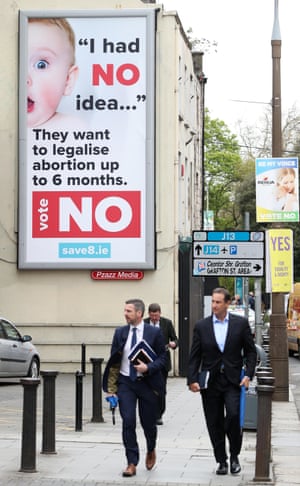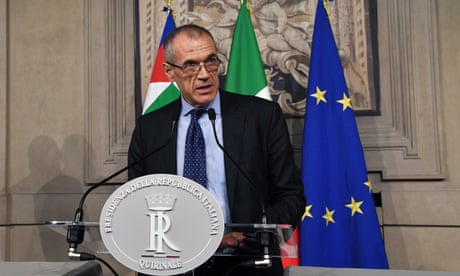In all the excitement of what happened in Ireland’s referendum on abortion, we should not lose sight of what did not happen. A vote on an emotive subject was not subverted. The tactics that have been so successful for the right and the far right in the UK, the US, Hungary and elsewhere did not work. A democracy navigated its way through some very rough terrain and came home not just alive but more alive than it was before. In the world we inhabit, these things are worth celebrating but also worth learning from. Political circumstances are never quite the same twice, but some of what happened and did not happen in Ireland surely contains more general lessons.
If the right failed spectacularly in Ireland, it was not for want of trying. Save the 8th, one of the two main groups campaigning against the removal of the anti-abortion clause from the Irish constitution, hired Vote Leave’s technical director, the Cambridge Analytica alumnus Thomas Borwick.
Save the 8th and the other anti-repeal campaign, Love Both, used apps developed by a US-based company, Political Social Media (PSM), which worked on both the Brexit and Trump campaigns. The small print told those using the apps that their data could be shared with other PSM clients, including the Trump campaign, the Republican National Committee and Vote Leave.
Irish voters were subjected to the same polarising tactics that have worked so well elsewhere: shamelessly fake “facts” (the claim, for example, that abortion was to be legalised up to six months into pregnancy); the contemptuous dismissal of expertise (the leading obstetrician Peter Boylan was told in a TV debate to “go back to school”); deliberately shocking visual imagery (posters of aborted foetuses outside maternity hospitals); and a discourse of liberal elites versus the real people. But Irish democracy had an immune system that proved highly effective in resisting this virus. Its success suggests a democratic playbook with at least four good rules.
First, trust the people. A crucial part of what happened in Ireland was an experiment in deliberative democracy. The question of how to deal with the constitutional prohibition on abortion – a question that has bedevilled the political and judicial systems for 35 years – was put to a Citizens’ Assembly, made up of 99 randomly chosen (but demographically representative) voters. These so-called ordinary people – truck drivers, homemakers, students, farmers – gave up their weekends to listen to 40 experts in medicine, law and ethics, to women affected by Ireland’s extremely restrictive laws and to 17 different lobby groups. They came up with recommendations that confounded most political and media insiders, by being much more open than expected – and much more open than the political system would have produced on its own.
It was these citizens who suggested entirely unrestricted access to abortion up to 12 weeks. Conservatives dismissed this process, in Trump style, as rigged (it wasn’t). They would have been much better off if they had actually listened to what these citizens were saying, and tried to understand what had persuaded them to take such a liberal position. The Irish parliament did listen – an all-party parliamentary committee essentially adopted the proposals of the Citizens’ Assembly. So did the government. And it turned out that a sample of “the people” actually knew pretty well what “the people” were thinking. If the Brexit referendum had been preceded by such a respectful, dignified and humble exercise in listening and thinking, it would surely have been a radically different experience.
Second, be honest. The yes side in the Irish debate handed its opponents a major tactical advantage but gained a huge strategic victory. It ceded an advantage in playing with all its cards turned up on the table. Technically, the vote was merely to repeal a clause in the constitution. There was no need to say what legislation the government hoped to enact afterwards. But the government chose to be completely clear about its intentions. It published a draft bill. This allowed opponents of reform to pick at, and often distort, points of detail. But it also completely undercut the reactionary politics of paranoia, the spectre of secret conspiracies. Honesty proved to be very good policy.
Yes campaigners did not assume that an elderly lady going to mass in a rural village was a lost cause
Third, talk to everybody and make assumptions about nobody. The reactionary movements have been thriving on tribalism. They divide voters into us and them – and all the better if they call us “deplorables”. The yes campaigners in Ireland – many of them young people, who are so often caricatured as the inhabitants of virtual echo chambers – refused to be tribal. They stayed calm and dignified. And when they were jeered at, they did not jeer back. They got out and talked (and listened) without prejudice. They did not assume that an elderly lady going to mass in a rural village was a lost cause. They risked (and sometimes got) abuse by recognising no comfort zones and engaging everyone they could reach. It turned out that a lot of people were sick of being typecast as conservatives. It turned out that a lot of people like to be treated as complex, intelligent and compassionate individuals. A majority of farmers and more than 40% of the over-65s voted yes.
Finally, the old feminist slogan that the personal is political holds true, but it also works the other way around. The political has to be personalised. The greatest human immune system against the viruses of hysteria, hatred and lies is storytelling. Even when we don’t trust politicians or experts, we trust people telling their own tales. We trust ourselves to judge whether they are lying or being truthful. Irish women had to go out and tell their own stories, to make the painful and intimate into public property.
This is very hard to do, and it should not be necessary. But is unstoppably powerful. The process mattered, political leadership mattered, campaigning mattered. But it was stories that won. Exit polls showed that by far the biggest factors in determining how people voted were “people’s personal stories that were told to the media”, followed by “the experience of someone who they know”.
Women, in the intimate circles of family and friends or in the harsh light of TV studios, said: “This is who I am. I am one of you.” And voters responded: “Yes, you are.” If democracy can create the context for that humane exchange to happen over and over again, it can withstand everything its enemies throw at it.
It was these citizens who suggested entirely unrestricted access to abortion up to 12 weeks. Conservatives dismissed this process, in Trump style, as rigged (it wasn’t). They would have been much better off if they had actually listened to what these citizens were saying, and tried to understand what had persuaded them to take such a liberal position. The Irish parliament did listen – an all-party parliamentary committee essentially adopted the proposals of the Citizens’ Assembly. So did the government. And it turned out that a sample of “the people” actually knew pretty well what “the people” were thinking. If the Brexit referendum had been preceded by such a respectful, dignified and humble exercise in listening and thinking, it would surely have been a radically different experience.
Second, be honest. The yes side in the Irish debate handed its opponents a major tactical advantage but gained a huge strategic victory. It ceded an advantage in playing with all its cards turned up on the table. Technically, the vote was merely to repeal a clause in the constitution. There was no need to say what legislation the government hoped to enact afterwards. But the government chose to be completely clear about its intentions. It published a draft bill. This allowed opponents of reform to pick at, and often distort, points of detail. But it also completely undercut the reactionary politics of paranoia, the spectre of secret conspiracies. Honesty proved to be very good policy.
Yes campaigners did not assume that an elderly lady going to mass in a rural village was a lost cause
Third, talk to everybody and make assumptions about nobody. The reactionary movements have been thriving on tribalism. They divide voters into us and them – and all the better if they call us “deplorables”. The yes campaigners in Ireland – many of them young people, who are so often caricatured as the inhabitants of virtual echo chambers – refused to be tribal. They stayed calm and dignified. And when they were jeered at, they did not jeer back. They got out and talked (and listened) without prejudice. They did not assume that an elderly lady going to mass in a rural village was a lost cause. They risked (and sometimes got) abuse by recognising no comfort zones and engaging everyone they could reach. It turned out that a lot of people were sick of being typecast as conservatives. It turned out that a lot of people like to be treated as complex, intelligent and compassionate individuals. A majority of farmers and more than 40% of the over-65s voted yes.
Finally, the old feminist slogan that the personal is political holds true, but it also works the other way around. The political has to be personalised. The greatest human immune system against the viruses of hysteria, hatred and lies is storytelling. Even when we don’t trust politicians or experts, we trust people telling their own tales. We trust ourselves to judge whether they are lying or being truthful. Irish women had to go out and tell their own stories, to make the painful and intimate into public property.
This is very hard to do, and it should not be necessary. But is unstoppably powerful. The process mattered, political leadership mattered, campaigning mattered. But it was stories that won. Exit polls showed that by far the biggest factors in determining how people voted were “people’s personal stories that were told to the media”, followed by “the experience of someone who they know”.
Women, in the intimate circles of family and friends or in the harsh light of TV studios, said: “This is who I am. I am one of you.” And voters responded: “Yes, you are.” If democracy can create the context for that humane exchange to happen over and over again, it can withstand everything its enemies throw at it.





